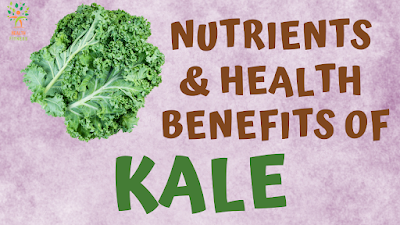Kale : Nutritional Riches and Health Benefits of Leafy Kale
When it comes to superfoods, few contenders can match the exceptional nutrient density and health benefits of Kale. This leafy green vegetable has been hailed as a nutritional powerhouse, and for good reason. From its impressive vitamin and mineral content to its potential to promote overall well-being, let's embark on a journey through the verdant world of Kale and uncover why it deserves a prominent place on your plate.
A Nutritional Powerhouse:
Kale is not your ordinary leafy green; it's packed with essential nutrients that make it stand out. A one-cup (about 67 grams) serving of Kale provides approximately:
- Calories: 33
- Vitamin A: 206% of the daily recommended intake (as beta-carotene)
- Vitamin K: 684% of the daily recommended intake
- Vitamin C: 134% of the daily recommended intake
- Vitamin B6: 9% of the daily recommended intake
- Folate: 5% of the daily recommended intake
- Calcium: 9% of the daily recommended intake
- Potassium: 9% of the daily recommended intake
- Copper: 10% of the daily recommended intake
- Manganese: 26% of the daily recommended intake
In addition to these, Kale is a source of other essential vitamins and minerals, including vitamin E, vitamin B2 (riboflavin), vitamin B3 (niacin), iron, and phosphorus.
Health Benefits:
Nutrient Density:
Kale is a nutritional powerhouse, offering a wide array of vitamins and minerals in a very low-calorie package. This makes it an excellent choice for those looking to maximize their nutrient intake while controlling calorie consumption.Antioxidant Rich:
Kale is rich in antioxidants, such as vitamin C and beta-carotene. These compounds help neutralize harmful free radicals in the body, reducing oxidative stress and lowering the risk of chronic diseases, including heart disease and certain cancers.Bone Health:
Kale is exceptionally high in vitamin K, which plays a crucial role in bone health. It helps in calcium absorption and contributes to bone mineralization, reducing the risk of osteoporosis.Heart Health:
The fiber, potassium, and antioxidants in Kale can support heart health. Fiber helps maintain healthy cholesterol levels, potassium regulates blood pressure, and antioxidants reduce inflammation.Cancer Prevention:
The compounds in Kale, such as sulforaphane, have been studied for their potential to combat cancer. These compounds may help inhibit the growth of cancer cells and reduce the risk of certain types of cancer.Eye Health:
Kale contains lutein and zeaxanthin, two antioxidants that promote eye health. They help protect the eyes from damage caused by harmful ultraviolet rays and reduce the risk of age-related macular degeneration and cataracts.Weight Management:
Kale is low in calories but high in fiber, making it a filling and satisfying addition to meals. Its fiber content supports weight management by promoting a sense of fullness and aiding digestion.Anti-Inflammatory:
Kale's phytonutrients have anti-inflammatory properties, which can help reduce chronic inflammation, a factor in many chronic diseases.
Incorporating Kale:
Kale's versatility makes it easy to include in your diet:
Salads:
Use Kale as the base for your salads. Its hearty texture stands up well to dressings and toppings.Smoothies:
Blend Kale into your morning smoothie for an extra boost of vitamins and minerals.Sautéed or Steamed:
Kale can be sautéed with garlic and olive oil or steamed as a side dish.Soups:
Add chopped Kale to soups and stews for added nutrition and texture.Kale Chips:
Bake Kale leaves with olive oil and seasoning for a crispy, healthy snack.
Cautions:
While Kale is an incredibly nutritious vegetable, it contains compounds called oxalates that can interfere with calcium absorption. If you are prone to kidney stones or have concerns about calcium absorption, it's advisable to consume Kale in moderation and ensure a varied diet.
Conclusion:
Kale's reputation as a nutritional superstar is well-deserved. Its exceptional nutrient density, health benefits, and culinary versatility make it a valuable addition to any diet. Whether you're aiming to improve your overall health, boost your immune system, or simply enjoy a delicious and nutritious meal, Kale is a leafy green that delivers on all fronts.





